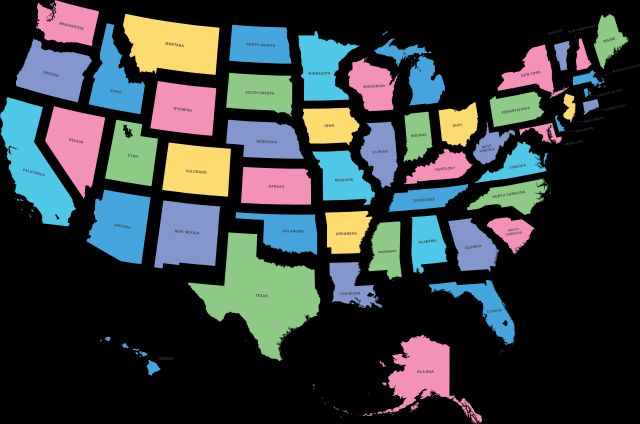
There was a time in the not-so-distant past when a small-business owner set up shop in a building. They hired employees, who showed up each day to that location, and they communicated with customers and clients by phone or (shudder) mail. Their customers usually lived in their community.
But as technology advanced, it was finally possible to conduct all business electronically. Any small business with an online presence could have customers in any corner of the world.
Before COVID-19 exploded on the scene, almost half (47%) of U.S. employees reported to an office five days a week. But thanks to the pandemic and the rise of Zoom and other video conferencing services, many of us (myself included) realized we could do the same work from anywhere … and we preferred it. Today, 44% of employees work remotely at least five days a week.
Of course, there’s a price for all this freedom. For the privilege of doing business in a state, you must pay its required taxes … and unfortunately, our 50 states cannot agree on much when it comes who should pay taxes, for what, and how often. This frequently leaves business owners in the dark, causing many to unwittingly violate tax laws they didn’t even know about.
Understanding Multistate Tax Compliance
Every state has its own set of required business taxes, and they usually involve some combination of the following:
- State income tax (individual and business)
- State sales tax
- Assorted state business fees/taxes, which may include corporate taxes, franchise taxes, or modified business taxes (such as in Nevada)
- State payroll taxes
Then there are local taxes. About one-third of states impose additional local income taxes, including Colorado, New York, and Oregon. San Francisco levies its own city taxes, including gross receipts, administrative office tax, homelessness gross receipts tax, and overpaid executive tax. And my personal favorite (not)? Indiana, where each of its 92 counties has its own individual income tax, all at different rates.
Then there’s unemployment tax — the federal government charges it, but in terms of the states, some do, and some don’t.
And there are the deadlines to keep track of. The federal government says business tax returns for S-corporations and LLCs are due by March 15. But in California, S-corps must file by March 15 while LLCs have until April 15. In Texas, Indiana, and Florida, they’re due in May. Delaware, on the other hand, has a February 28 deadline, with a $200 late fee being assessed starting on March 1.
Additionally, some states require businesses whose employees travel there for work — California, for example — to pay state income tax, even if it’s only for a day. If a company is based in New York, it doesn’t matter where you live and work; you pay New York state taxes.
Online commerce is another tricky area. Of course, if your business has a presence in a state that requires you to track and pay sales tax, you will owe it. But if you make a certain amount of sales revenue from another state, you may be required to collect and pay sales tax there, too, even if your business has no presence there. For example, in Arizona, remote sellers have to pay transaction privilege taxes, meaning that out-of-state sellers without physical presences in the state have to pay taxes on sales within Arizona. And while its sales threshold is $100,000, the threshold in California is $500,000. But Delaware, Oregon, New Hampshire, and Montana have no sales tax at all.
As you can see, today’s small-business owner can potentially face a mountain of multistate tax compliance conundrums, from wrestling with assorted deadlines and late penalties to paying for taxes they’ve never even heard of. And while it might be tempting to risk not filing and then plead ignorance if you’re caught in noncompliance, it’s a bad idea that could potentially land you in hot water, legally and financially.
This is why you need a tax specialist who knows what to look for and how to find it, to ensure you stay on top of your tax requirements.
Multistate tax compliance has been a priority for me and my firm since our earliest days in business, which is why many of our clients are business owners who have offices in multiple states. When I opened Ludmila CPA in 2012, one of my first customers was a business owner with operations in Georgia, North Carolina, South Carolina, California, and Nevada. I realized pretty quickly that you have to be very diligent with the states because the penalties for not doing so are high.
This year alone, my firm is filing corporate tax returns in 20 states for our clients. It’s colossal work that involves constant research into each state’s (and perhaps the county’s and municipality’s) tax laws, which can always change, then ensuring all documents are completed thoroughly and taxes paid, by their appropriate deadlines.
Trusting software to do this is a risky proposition because you must know what you’re looking for and how the nuances of your particular business can have tax repercussions that may not even have occurred to you. And most business owners I know have plenty of work to occupy their time without poring over tax laws all day.
If you’re doing business in more than one state — or if you think you might be — contact us. We’ll ask the right questions and do the research for you to ensure you’re meeting all your obligations in timely fashion. My team and I are constantly monitoring the ever-shifting tax requirements in our 50 states, so you won’t have to.